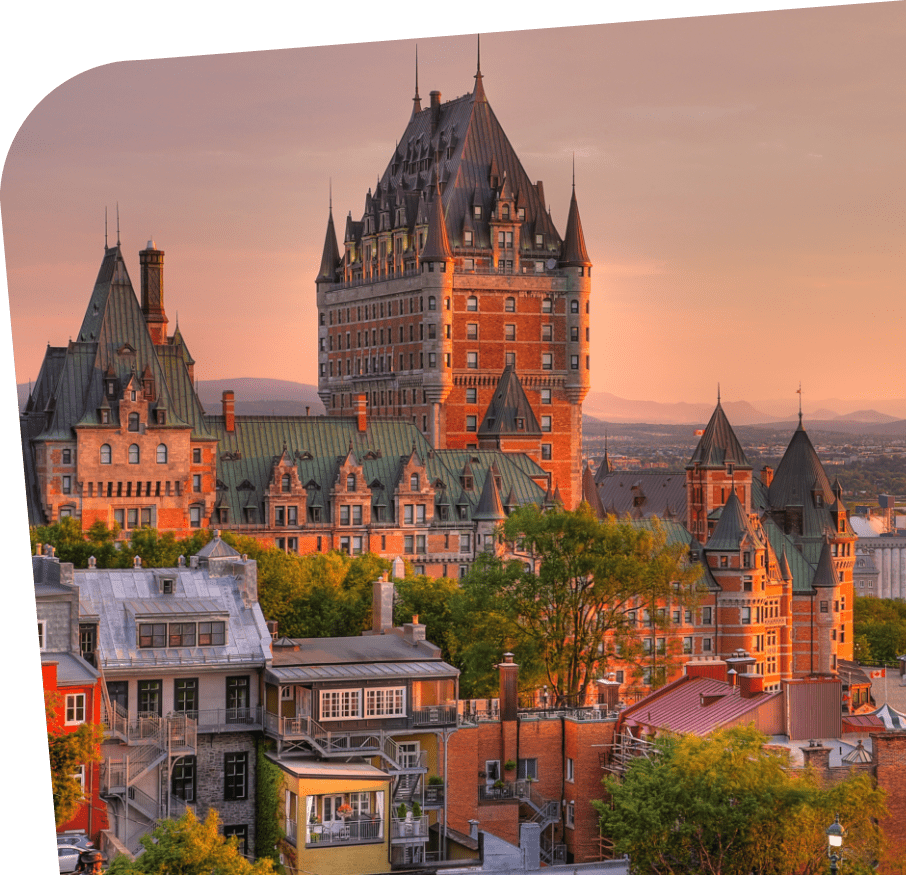Quebec Skilled
Worker Program
Canada is one of the best relocation destinations for individuals and families looking to live and or work abroad. Each province and territory is a unique place to live in Canada and offers immigrants many opportunities. Skilled immigrants with the desire to relocate to Canada permanently and reside in the French-speaking province of Quebec must apply for the points-based Quebec Skilled Worker Program (QSWP). This two-step Canadian immigration program essentially involves sending in an application for the QWSP, and if Quebec’s provincial officials respond by issuing the Certificat de Selection du Quebec (CSQ), the next thing to do is applying for a Canadian immigration visa with the national government. If the Canadian immigration agency approves the QSWP applicant for permanent residency, the foreign worker and his or her family members will be allowed to live and work in Quebec long-term.


Living in Quebec
Quebec is a spectacular choice for permanent residence in Canada, because of its history, culture, people, and natural scenery. This expansive Canadian province was initially occupied by the French, while the remainder of present-day Canada was inhabited by the British. For this reason, the majority of people living in Quebec speak French, although many of them speak English as well. This is unlike Canada’s other nine provinces and three territories, in which a majority of the residents speak English, though many also understand French. Quebec’s unique French-Canadian way of life makes it different from the rest of the country and a very special place to live in Canada.
Quebec is a major Canadian tourist destination for people from all over the world, making it one of the major contributors to Canada’s economy. Apart from being the largest province in Canada, Quebec also has the second largest population and economy, which is one of the major Canadian job creators.
Additionally, Montreal is the second most populous Canadian city and ranked 21st out of about 450 in rankings of cities around the world with the best quality of life, as evaluated by the Mercer Global Quality of Living Survey in 2018.
Quebec is a great location for quality education; it houses a number of the best universities in Canada. It is the ideal place to live for families looking to experience a high standard of living and skilled foreigners with the ability to communicate in French.
QSWP Overview
The Quebec Regular Skilled Worker Program is a points-based Canadian immigration program for foreign workers interested in living and working in Quebec. Points are given out based on different factors, and it requires a minimum number of points, which depends on whether the applicant is single (minimum of 50/103 points) or married (minimum of 59/120 points). The QSWP selection factors include education/training, French or English language skills, work experience, characteristics of the spouse/partner (if relevant), age, receiving a qualifying offer of employment in Quebec, having family or a previous stay in Quebec, being financially self-sufficient, and even for having children!
Essentially, the Quebec Skilled Worker Program application uses a two-step process.
The first step of the application process is the submission of an Expression of Interest (EOI) by the applicant via Quebec’s online “Arrima” system. The content of the EOI includes the applicant’s personal information, details of his or her education, work experience, contact details, valid job offer, English and/or French communication abilities, as well as other details. It is possible for applicants to update their EOI online if needed. The EOI will then be reviewed by the Quebec provincial authorities and placed in the Expression of Interest Bank (EIB) if the applicant meets the QSWP criteria. If an applicant receives the Certificat de Selection du Quebec (QSC), also known in English as the Quebec Selection Certificate, he or she can proceed to the next stage of the application process.
In the second step, the applicant is given 90 days to send in the application for permanent residency, along with the needed documents and fee(s), to the Canadian immigration office. The appropriate national immigration officials will examine the Canadian visa application, medical report(s), along with other submitted documents. They will also carry out a background check of all the applicants. The applicant will receive a Confirmation of Permanent Residency (COPR), and a stamp of permanent residency in his or her passport, if the application is approved by the Canadian immigration office.
The new immigrant will then be permitted to relocate to Canada and live and work in Quebec. After the second stage of the application process, the applicant will be required to pay the Right of Permanent Residence Fee (RPRF), as well as another governmental fee for a Permanent Resident Card, which is carried by immigrants as identification while living in Canada.
This is just a short overview of the important qualifications for the Quebec Skilled Worker Program (QSWP). Please be aware that the QSWP criteria and procedures can be altered at any point in time by the Canadian immigration authorities.
Permanent Residency
Benefits
Foreign workers and their family members whose requests for Permanent Residency in Canada are approved enjoy several benefits. For instance, a permanent resident can live in Canada for a limitless period. People with permanent residency via the Quebec Skilled Worker Program (QSWP) can legitimately work and study in Canada as well. Some of the other benefits of having permanent residency include having a bank account, a driver’s license, being able to purchase a house, the ability to travel at will to and from Canada, starting a business, and even being a sponsor for qualified relatives to receive a Canadian visa. Permanent residents may apply to become Canadian citizens after living in Canada for at least three years and fulfilling other qualifications. If the citizenship application is approved, the immigrant will also be able to apply for a Canadian passport, vote in elections and run for political office, among other benefits.
